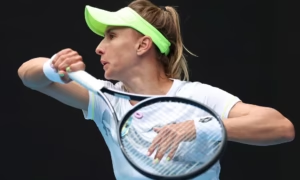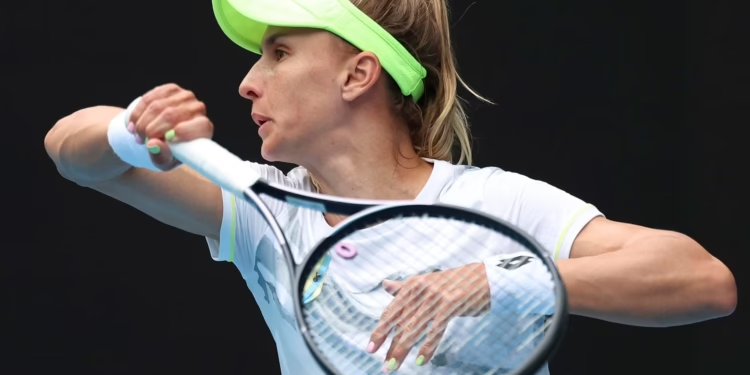Lesia Tsurenko Sues WTA and Chairman Over Handling of Russian and Belarusian Players Amid Ukraine War.
In a move that has drawn significant attention across the tennis world, Ukrainian tennis star Lesia Tsurenko has updated her legal battle against the Women’s Tennis Association (WTA) and its chairman Steve Simon. The amended lawsuit, filed in the federal court for the Southern District of New York, alleges serious missteps and broken promises by the WTA in its response to the ongoing war between Russia and Ukraine.
Tsurenko, who once ranked within the top 25 players globally, asserts that the WTA and its leadership failed to act appropriately in banning Russian and Belarusian players who publicly supported Russia’s military aggression in Ukraine. The updated complaint accuses the organization and its chairman of breach of contract, negligence, and the negligent infliction of emotional distress.
According to the amended court documents, Tsurenko and other Ukrainian players were given verbal assurances during a meeting with WTA executives—including Simon, who served as the WTA’s CEO at the time—that the tour would impose sanctions or bans on Russian or Belarusian athletes who voiced support for their countries’ military actions in Ukraine. These reassurances were meant to alleviate some of the emotional burden Ukrainian players were enduring while continuing to compete alongside players from the countries responsible for the ongoing conflict.

Despite those assurances, Tsurenko’s lawsuit argues that no concrete action was taken to follow through on that commitment. In particular, she highlighted instances where Russian players were seen aligning with or representing organizations closely linked to the Russian state or military.
One example she cited in the legal filing involved Veronika Kudermetova, a prominent Russian tennis player, who wore a logo for Taneft, a company identified as a subsidiary of an EU-sanctioned Russian entity due to its connections with the Russian military. The lawsuit argues that this public display represented a tacit endorsement of the war and should have led to disciplinary action under the terms Ukrainian players believed the WTA had agreed to uphold.
Despite this, the WTA allowed Kudermetova and others in similar situations to continue competing without penalty. Tsurenko claims that this failure not only violated the promises made by WTA executives but also created an unsafe and emotionally distressing work environment for Ukrainian players.
In response to the lawsuit and public scrutiny, the WTA issued a formal statement, reaffirming its stance against Russia’s invasion of Ukraine and expressing solidarity with Ukrainian athletes. The organization stressed that it had consistently condemned the actions of the Russian government and had supported Ukrainian players in various ways throughout the conflict.
“The WTA has been steadfast and clear in its condemnation of Russia’s war on Ukraine and the actions of the Russian government against the Ukrainian people,” the statement read. “We have taken numerous steps to assist our Ukrainian player members, who have faced great challenges as professional athletes.”
The WTA also emphasized its founding principles of inclusion and equal opportunity, reiterating that all female players should be allowed to compete based on their individual merit, regardless of their nationality. “Consistent with those principles,” the WTA noted, “and in common with other tennis organizations, the WTA has taken the position that individual athletes should not be penalized for the actions of their governments.”
This position aligns with the broader approach adopted by most international sports organizations since the outbreak of the Russia-Ukraine conflict. While many sports bodies condemned the invasion, few implemented outright bans on individual Russian or Belarusian athletes unless those athletes explicitly made political statements in support of the war.
Tsurenko’s lawsuit goes beyond political disagreements. She argues that the WTA’s inaction has had a profound emotional impact on her and her fellow Ukrainian players. Competing in an environment where Russian and Belarusian athletes continue to participate without consequences, despite their associations or endorsements of wartime entities, has been deeply distressing, she says.
The lawsuit claims that this environment led to serious mental health repercussions for Tsurenko, including anxiety, emotional trauma, and a sense of abandonment by an organization that she once trusted to prioritize fairness and moral responsibility. She accuses the WTA of creating a psychologically harmful workspace, especially for athletes from war-torn regions like Ukraine, by ignoring the emotional weight of the conflict and its presence on the global tennis stage.
This legal action also raises broader questions about the responsibilities of international sporting organizations when geopolitical conflicts spill over into the arena of global competitions. For Tsurenko and her supporters, neutrality is not an acceptable option in the face of what they see as blatant aggression and violations of international norms.
Since Russia’s invasion of Ukraine in early 2022, the sports world has struggled to find a consistent and ethical approach to handling Russian and Belarusian athletes. Some sports, such as football and the Olympics, opted to suspend teams representing Russia and Belarus from participating under their national flags. Others, including tennis, chose a more nuanced approach: allowing individual athletes to compete under neutral flags as long as they refrained from making political statements.
This middle ground has not satisfied everyone. Critics argue that the mere presence of Russian and Belarusian athletes at international events sends the wrong message—that aggression can go unpunished if the perpetrator is powerful enough. Supporters of the WTA’s policy, however, believe that banning athletes based on nationality alone would be discriminatory and a violation of basic human rights.
Tensions have flared in the tennis community multiple times since the war began. Matches between Ukrainian players and their Russian or Belarusian counterparts have sometimes ended without the customary post-match handshake, leading to media scrutiny and further dividing opinions within the sport. Some Ukrainian players have boycotted matches or tournaments altogether to protest what they view as a failure of leadership within the sport.
Tsurenko’s lawsuit could set a precedent for how sports organizations handle similar issues in the future. By alleging breach of contract and negligence, she’s challenging not just the WTA’s policies but also its moral accountability in times of global crisis. The court will have to assess whether verbal promises made during internal meetings can be enforced as binding obligations, and whether the WTA’s failure to act constitutes a breach of duty to protect its athletes’ emotional well-being.
Moreover, the inclusion of a claim for negligent infliction of emotional distress highlights a growing area of concern in the professional sports world: the mental health and emotional safety of athletes. While much focus has been placed on physical injuries and doping regulations, lawsuits like Tsurenko’s could open the door to broader scrutiny of how sports organizations manage the psychological welfare of their players, particularly during geopolitical or humanitarian crises.
If successful, her case may also force governing bodies in other sports to re-evaluate their approaches to dealing with politically sensitive situations and to place greater emphasis on the moral and ethical implications of neutrality.
Lesia Tsurenko’s legal battle with the WTA represents more than just a contractual dispute—it’s a direct challenge to how global sports bodies navigate the complex intersection of politics, ethics, and individual rights. As the court proceedings unfold, the sports world will be watching closely to see whether athletes like Tsurenko can compel their governing organizations to take stronger moral stances in times of conflict.
While the WTA has reiterated its commitment to fairness, equality, and the support of Ukrainian athletes, Tsurenko’s lawsuit paints a different picture—one of unfulfilled promises and emotional hardship exacerbated by what she sees as a lack of accountability. The outcome of this case could reshape expectations for how athletic organizations handle moral responsibility in an increasingly politicized world of sports.








